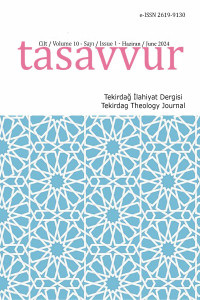Aḥmed el-Çârperdî’nin Usûl Düşüncesinde İhtilaflı Deliller
Controversial Evidences in The Usūl Thought Of Aḥmad Al-Chārpardī
Author(s): Davut EşitSubject(s): Islam studies, Sociology of Religion, Qur’anic studies
Published by: Tekirdağ Namık Kemal Üniversitesi İlahiyat Fakültesi
Keywords: Uṣūl al-Fiqh; al-Bayḍāwī; al-Chārpardī; al-Sirāj al-wahhāj; Controversial Evidences;
Summary/Abstract: Aḥmad al-Chārpardī (d. 746/1346), Shāfi‘ī jurist, was one of the scholars of the period of mutakkhkhirīn. He dedicated his life to teaching students and composing works, settling in Tabriz where he remained for the rest of his life. Recognised as one of the most distinguished students of al-Qāḍī Batḍāwī (d. 685/1286), al-Chārpardī wrote a commentary on al-Bayḍāwī’s concise work on uṣūl al-fiqh entitled Minhāj al-wuṣūl, which he called al-Sirāj al-wahhāj. One of the fundamental characteristics of uṣūl al-fiqh of the mutaakhkhrīn period is the structuring of issues and evidence using the terminology of theology, logic, dialectics and disputation. Based on the systematic approach of alBayḍāwī’s work and the understanding of uṣūl al-fiqh of his time, al-Chārpardī discusses the issues and evidence that al-Bayḍawī succinctly addressed. The aim of the study is to determine Chārpardī’s methodology in jurisprudential thought, the scholars who influenced him, and the method he employed in jurisprudential debates by focusing on the evidence that falls outside the unanimously agreed upon evidence, which includes the Qur’ān, Sunna, ijmā‘, qiyās and is subject to debate as to its validity. The limited number of studies on alChārpardī in Türkiye, such as those found in the TDV İslam Ansiklopedisi and the İslam Düşünce Atlası, this study is seen as contributing to an increase in research focusing on Chārpardī’s jurisprudential thought.
Journal: Tasavvur Tekirdağ İlahiyat Dergisi
- Issue Year: 10/2024
- Issue No: 1
- Page Range: 277-308
- Page Count: 32
- Language: Turkish

